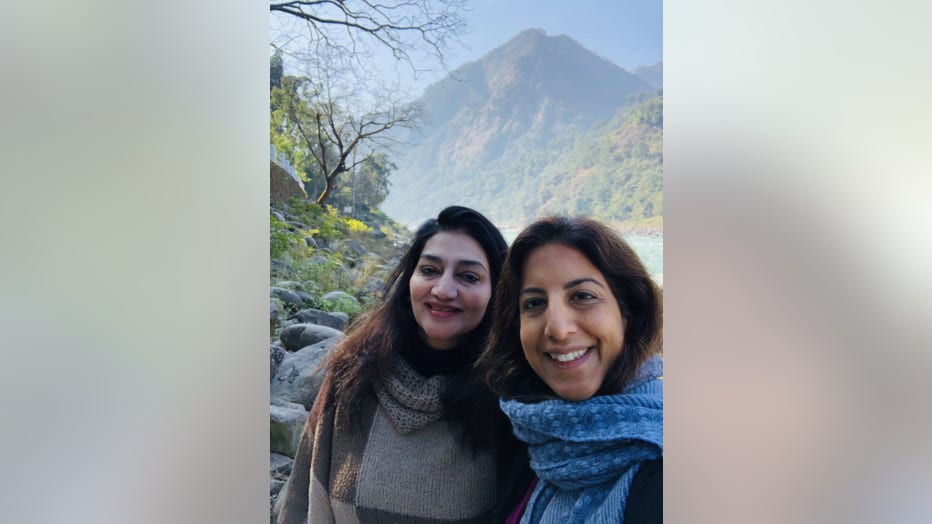Austin doctors communicating with family in India describe chaos, devastation

Austin doctors communicating with family in India describe chaos, devastation
As of Friday, India has seen more than 200,000 deaths attributed to COVID-19 and more than 18 million cases.
AUSTIN, Texas - As a local ER doctor and global health care specialist, Dr. Natasha Kathuria has been on the frontlines of COVID-19 over the past year. Right now, she is still on the frontlines but from thousands of miles away.
"It’s devastating the stories I’m hearing from friends and family on the ground (in India)," she said. "People are literally going hospital to hospital, clinic to clinic, to pharmacies, just begging for medications to keep their loved ones alive, and they're dying, some of them on the streets."
Dr. Kathuria has multiple family members in India. They’ve been communicating on WhatsApp, and she’s done what she can to give advice as a medical professional and reassurance as a loved one. However, it’s been hard with the time zone difference and being thousands of miles away.
"Once someone gets critically ill, there’s not much I can do," she said. "I don’t have the ability to call a hospital there and check if they have oxygen or beds like I could do as a physician in America."
Dr. Shelly Sethi, an Austin family physician, also has family in India. She told FOX 7 on Friday that she has eight family members that are sick. One of her cousins passed away from COVID-19 less than a week ago.
"I have another cousin who I spent the last three nights desperately making phone calls for to vendors all over Delhi trying to find oxygen for her," said Dr. Sethi.
She also has another relative that is at home with a broken hip. She can’t get to a doctor, and she can’t get pain medication.
DOWNLOAD THE FOX 7 AUSTIN NEWS APP

A photograph of Dr. Sethi and her cousin who she says passed away from COVID-19.
SIGN UP FOR FOX 7 AUSTIN EMAIL ALERTS
"The system is completely overwhelmed," said Dr. Sethi. "And they’re not even able to grieve; you’re grieving for one person and then hearing about another or getting sick yourself."
Dr. Sethi said that some temples and religious sites have opened oxygen bars just so people can have access to oxygen for a few hours.
"This is just another level of lacking basic resources," said Dr. Kathuria. "Forget Remdesivir, forget medications, just oxygen."
Because demand is outpacing supply, Dr. Sethi said it’s also opened the door for price gouging to take place.
"For some of the treatments that typically cost about $300 here in the US, I saw family members pay about $4,000 dollars to get," she said. "That’s for part of what’s just our basic protocol for Covid right now."
As of Friday, India has seen more than 200,000 deaths attributed to COVID-19 and more than 18 million cases. Friday alone set a global daily record of reported cases - more than 380,000.
Experts believe the actual number is much higher.

Your Health with Dr. Kumar: COVID-19 in India
The U.S. is sending medical supplies to help India as the country battles a spike in COVID-19 cases. Dr. Kumar talks about this and its impact on the country's healthcare.
Dr. Sethi and Dr. Kathuria believe it’s the consequence of relaxing restrictions too much and too early, along with people letting their guard down because of a younger population and lower obesity rate.
Earlier this month, the Kumbh Mela religious festival attracted millions of people.
They also noted the dense population in cities like Mumbai - where Dr. Kathuria’s family is. Additionally, multiple generations often live in one household, along with having cooks or drivers come in and out of the home.
A new, aggressive variant has also contributed.
"The majority of people we’re hearing about are getting infected, have mild symptoms day 1-10 and then in that second week they just really crash hard," said Dr. Sethi.
Another factor - less than 2% of India has been fully vaccinated. Ironically, the Serum Institute - the world's largest vaccine-producing company is in India. Dr. Kathuria said they’re shipping vaccines to other, wealthier countries.
Along with helping her own family by looking over their labs - alongside her sister, brother-in-law, and husband who are all healthcare workers in the U.S. - Dr. Sethi is working with a group of more than 100 doctors in the United States and other countries. She said they had an orientation on Thursday, where they discussed being able to set up some kind of teleconsulting program for patients in India, especially those in more rural areas without access to a hospital.

Report looks at toll COVID-19 pandemic took on downtown Austin
The Downtown Austin Alliance is calling on residents to help re-invigorate downtown Austin.
In the meantime, both women asked for Texans to be aware of what is happening on the other side of the world, despite improvements in the U.S.
"It’s really upon all of us to consider how can we reach the rest of the world," said Dr. Sethi. "Can we join efforts to get them the resources they need, can we donate money, or can we just send prayers."
Dr. Kathuria mentioned UNICEF, Give India and the Indian Red Cross as trustworthy organizations accepting donations as they work on the ground in India.
"It’s difficult to feel the pain of another country when we’re living in a country where things feel pretty good right now," said Dr. Kathuria. "But our world is smaller than it’s ever been...one country’s problem is the world’s problem."

